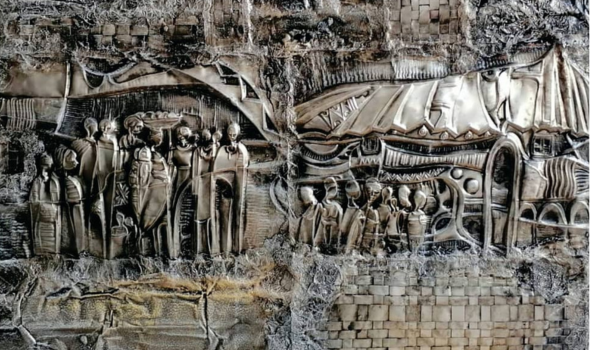Art and the environment: The potential for art as a tool for social change
Art and the environment: The potential for art as a tool for social change

Yusuf Seidu Okus wants to offer new perspectives on migration and mental health. The Nigerian artist, who now lives in Coventry, uses discarded materials such as plastic and aluminium foil along with acrylic and oil paints to create art, showing how it takes a new attitude to imagine possibilities – not just in his works, but in how humans interact with their surroundings.
Although he had worked on issues of migration before moving to the UK in 2023, the artist shares that since then, the topic has become more salient in his practice – and as one that could use policy change.
“Migration is a natural thing, as long as the world is concerned. Over time, people have always migrated, for one reason or the other”, Yusuf said. That does not mean, unfortunately, that governments are well-equipped to support migrants.
This motivated him to dig even more into the empathy that drives his practice, and how people who migrate can face challenges that negatively impact their mental health. “You can imagine what somebody goes through, some of them with families. They go through so much trying to get [themselves] reintegrated into society”, he said. “Sometimes you don't even know where to start from”.
A student of art, he graduated with a Higher National Diploma in General Arts and Painting in 1997. During his formal education, learning classic techniques and references, he was able to develop foundational skills, and later transform them. “As time goes on, you realise that because of your interaction with a lot of artists, because of the books that you read, because of the places that you go to, workshops that you attend, – outside the academic environment, – you come to realise that what you're being taught in school is a little bit different from what you experienced outside,” he explained. This attention to the surrounding contexts, materials and messages has always guided his work.
“Art is an extension of the environment”, Yusuf said. One of the places in which he saw the transformative potential of art was at the Federal Neuropsychiatric Hospital in Southern Nigeria, where he was the Principal Art Production Officer between 2005 and 2023. There, he witnessed how the care and attention from health professionals, along with art in occupational therapy, could make a difference.
It was through this experience that Yusuf realised the magnitude of the stigma surrounding mental illness. A lot of the time, he said, it felt as if people who struggled with mental health were being discarded. Here, he draws a parallel: through art, he has discovered ways to give new meaning to what others might not see as adequate or valuable. This is both in relation to his materials and his practice, helping others.
“I see waste as treasure”, the artist adds. And through empathy, he sees people who may otherwise not get a second chance as agents of change and protagonists. “My work, actually, is to advocate, to spark a discourse, about issues that need to be addressed”, be it from an environmental perspective or the injustices in treating people who need psychological or psychiatric support.
Just as our ‘immediate environment’ has expanded with technology and access to information at our fingertips, so has the reach and potential of artistic practice. Yusuf explains that “every real work of art, especially work that talks about issues that people face – of environment, especially, – they generally spark a discourse, which actually leads to some kind of policy formulation eventually”.
By engaging with people and issues, Yusuf’s art is a statement, a spark for conversation, and for change. The act of showcasing injustices “beyond the four walls” of where they exist is how he hopes to create empathy with the viewers, who may otherwise have never thought about a certain topic or condition affecting fellow human beings.
For the future, Yusuf hopes to continue showcasing his art in different places and platforms. One of the ways to do that, he explains, would be to establish a space in which communities (migrant or not) can come together and learn from him and each other.
You can learn more about his work through his website.
Photo credits: "MORE HOUSING III", discarded Aluminum roofing sheets, printing plate and metal foil (by Yusuf Seidu Okus).


